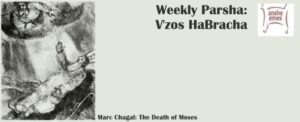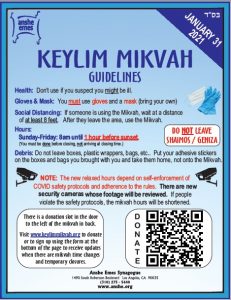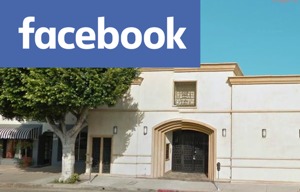V’ZOS HA’BROCHOH
I. Summary
A. Moshe’s blessing. Before his death, Moshe issued a blessing to Israel. In very stylistic and formal language, he described the good fortunes that would be granted to each of the tribes. He concluded with praise of Hashem whose protection of and love for the people are everlasting, provided the people reciprocate with recognition and acceptance of Hashem’s L-rdship.
B. Moshe’s death. Moshe’s life was nearing its end. He ascended from the plains of Moav to reach the heights of Mt. Nevo, the summit of Pisgah. There, alone with G-d, he was shown all the land of Gilad, until Dan, all of Naftoli, Ephraim, Menassheh and Yehudah, until the sea, the Negev in the South, and the Valley of Jericho, as far as Zoar. This, Hashem promised him, was the land that would be given to the Children of Israel, as their forefathers had been told. Then Moshe, in the land of Moav, went to his everlasting peace. He was buried in the valley, but, to this day, no one knows the exact site of his burial. Although Moshe had been 120 years old when he died, he had remained physically, spiritually and intellectually vital until the very end.
C. The Jews mourn the loss of Moshe. The Bnei Yisroel mourned the great loss of their leader for thirty full days. Then they turned toward Yehoshua, their new leader, who would guide them towards the conquest of the land of Canaan under Hashem’s supervision. The Torah concludes with the statement that “There has not arisen a prophet since, in Israel, like Moshe, whom the L-rd knew face to face. . . . “
II. Divrei Torah
A. Lilmode U’lilamed (Rabbi Mordechai Katz)
The importance of a congregation. “Torah tziva lonu Moshe, Morasha Kehillas Yaakov.” This verse, which means, “Moshe commanded us the law, the inheritance of the congregation of Yaakov,” is a most important one in the framework of the Jewish religion. The Talmud states that it is a verse which must be taught to each child. A child who appreciates this will develop into a loyal Jew. The inclusion of the word “congregation” in this passage teaches us that the Jewish people can thrive only if it remains a congregation, a unified whole.
B. Living Each Week (Rabbi Abraham Twerski)
1. Refining one’s character. Rashi quotes Sifri that prior to the Revelation of the Torah to the Israelites, G-d had offered it to other nations, who rejected it when they were, respectively, informed that it prohibited killing, theft and adultery. The Midrash explains that G-d offered the Torah to all other nations first so that when the day of reckoning comes, they will be unable to claim that Hashem’s choice of Israel was unfair. The Rabbi of Gur comments that the nations might still have a legitimate complaint. They were introduced to such rigid demands as abstaining from murder, theft and adultery, whereas the Israelites were told that the Torah demands belief in G-d, since the first commandment given to them was “I am the L-rd your G-d.” They will say, “Had You approached us as You did the Israelites, we would have accepted the Torah.” The Rabbi of Gur explains that the purpose of Torah is to refine one’s character, as the Midrash says, “the sole reason for the mitzvos is to purify the person.” The acceptance of Torah is therefore contingent upon one’s willingness to modify one’s character traits. Each nation was therefore approached with the commandment pertaining to the character defect unique to its people. With the Israelites, the defect was skepticism. What other nation, having witnessed countless miracles (the plagues in Egypt, splitting of the Red Sea, Revelation at Sinai, manna, etc.) would remain skeptical and revert to idolatry? Our national weakness is an obstinate refusal to believe, and that is why we were challenged with “I am the L-rd your G-d.” Our ancestors struggled with belief, and the prophets repeatedly warned us what would befall us if we abandoned our trust and belief in G-d. Each day of our lives we must reaffirm our belief when we recite the Shema. Let us reflect on our testifying to our belief in G-d, and be on our guard against what is our inherent weakness.
2. The endless cycle. When we complete the annual reading of the Torah on Simchas Torah, we immediately begin reading the first portion of Genesis, to indicate that there is no end point in Torah, but that it is similar to a circle which has no beginning and no end. Thus, the last verse of the Torah is contiguous with its first verse.
C. Parsha Parables (Rabbi Mordechai Kamenetzky)
Drasha, Copyright (c) by Rabbi M. Kamenetzky and Project Genesis, Inc.
Drasha is the e-mail edition of FaxHomily a Project of the Henry and Myrtle Hirsch Foundation. Rabbi Mordechai Kamenetzky is Associate Dean ofYeshiva of South Shore http://www.yoss.org/
Parting words. What were Moshe’s last words spoken to the Jews? Moshe stood on a mountain, surveying the Land of Israel from a distance. His great dream of entering Israel had faded away, for he was not allowed to enter the land; he could only look from afar. Why? Provoked by a weary and thirsty nation, he disobeyed Hashem’s command to speak to a rock. Instead, Moshe hit the rock while shouting, “listen, you rebels.” Moshe appealed the verdict 515 times — all to no avail. Finally, he stood alone, while more than a million people — those he cared for, fed and guided — were about to cross the Jordan River and enter the Land of Israel. He must say goodbye to the nation that caused his solitary and eternal confinement near the barren sands of Mt. Nevo. What should he tell them? Moshe had every excuse to gaze at his nation and say, “you know had it not been for your impatience, I would be joining you.” Yet he didn’t. Moshe’s last recorded words were only those of high praise. Moshe only saw the greatest attributes in the Jewish people. At a time when the pain of their inconsistencies should have been most biting, he only had high regard and blessings for them. As such, Moshe had attained a great level of love for his fellow man. It isn’t easy, but it is something to which we should all aspire.
D. Growth Through Torah (Rabbi Zelig Pliskin)
Utilize all that you have to serve Hashem. The Rambam states that every person who wishes to be righteous has the ability to be as righteous as Moshe. Rabbi Elchonon Wasserman explained that this does not mean that others can reach the elevated spiritual level of Moshe. Rather, the intent of Rambam can be understood with the Radak’s interpretation of the words, “servant of the Almighty.” The Radak explains that just as all that servant does if for his master, so too Moshe utilized all that he had just for Hashem. All of his abilities and talents were devoted to serving Hashem. Similarly, everyone else is able to devote all he/she has to serve Hashem.
E. Peninim on the Torah (Rabbi A.L. Scheinbaum)
An eternal legacy. “And so (Moshe), servant of Hashem, died there.” The Torah’s description of Moshe’s death seems to be an innocuous event. Horav Dovid Feinstein, Shlita, takes notes of the word “there”. He suggests that the Torah is implying that Moshe had only died “there,” suggesting that he did not die in other places. Indeed, Moshe’s soul lives on in all places where Torah is learned and lived, in order to inspire every Jew throughout history. We may apply this insight to the actual concept of life and death. One who lives his life in this world and leaves it a better place has not truly died; rather, his legacy remains for all future generations.
F. Divrei Torah (National Council of Young Israel)
Simchat Torah. Strangely, the holiday when Jews rejoice with the Torah, Simchat Torah, takes place not on Shavuos (when the giving of the Torah is observed), or on Yom Kippur (when the second Tablets were given)? Rather, at the end of the reading cycle, when the whole Torah has been read, we burst out in the holiday singularly devoted to rejoicing with the Torah — and we celebrate Simchat Torah. Torah and its meaning are not limited to a particular aspect of our existence. Torah encompasses not only a segment of our life but the totality of our life. Torah addresses the Jew in the wholeness, fullness, richness and complexity of his existence. Hence, only when a Jew passes through the whole year of Torah reading, when the whole of life, its better moments and worse moments, it ups and downs, its joys and tragedies, when under all circumstances we retain loyalty and fidelity to Torah — only then can we truly rejoice with the Torah.
Chazak, Chazak, Vinischazaik
A Personal Epilogue:
While outlining the Chumash over the past few years has been a true “labor of love,” I did want to mention a few thank you’s:
- First to my wife Susie, who has supported me in my learning. Susie has taught me a lot not only about Judaism, but about life. Her insights and ability to see and appreciate G-dliness in everyone and everything has been and continues to be a tremendous source of inspiration to me. She is a true Aishes Chayil.
- Second to my mother (z’tl), father and sister, who gave me a warm and wonderful upbringing, instilled with a love and appreciation for Judaism. My parents made tremendous personal sacrifices to ensure that my sister and I were provided with a first rate Jewish education and that we were raised in a truly Jewish home.
- Third to the Lubavitcher Rebbe, Rabbi Menachem M. Schneerson, z’tl, who had the foresight to build a day school in Long Beach and, in so doing, provide my sister and me with a terrific Jewish education. I have always been struck by his teachings, and his constant affirmation of the inherent worth of every person. His eyes and heart were open to everyone, and his legacy continues to inspire millions.
- Finally to my many teachers (including, but by no means exclusively, Rabbis Czapnik, Engel, Goldberg, Kanefsky, Summers and Ullman), who have given of their time and themselves to help me grow as a Jew and a person. I have learned not only through their teachings, but through their example as well.




 Visit the group and request to join.
Visit the group and request to join.
